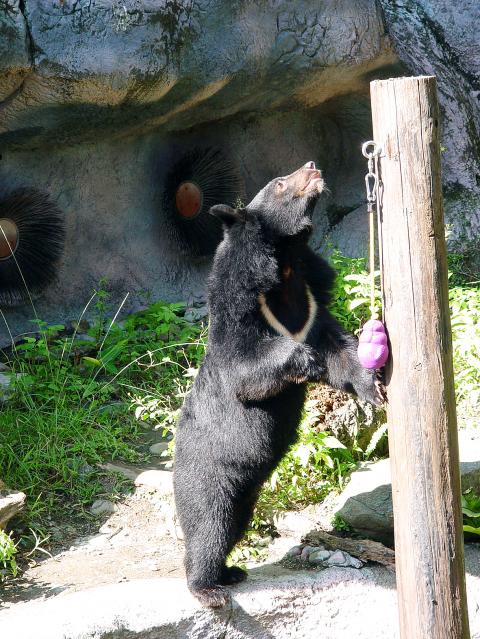|
Long-term plans to save
Formosan bears unveiled
By Ho Yi / Staff reporter

A Formosan black bear is seen in
this undated photo.
Photo courtesy of Taiwan Aquarium and Zoological Parks Association
The Taiwan Aquarium and Zoological Parks
Association yesterday announced a long-term conservation plan for the nation’s
Formosan black bears, listed as an endangered species following the enactment of
the Wildlife Protection Act (野生動物保育法) in 1989.
The mighty animals are one of Taiwan’s national symbols, but their numbers have
dwindled due to of habitat encroachment and poaching.
A subspecies of the Asiatic black bear, Formosan black bears are the only bear
species native to Taiwan. There are no exact figures on how many of the bears
live in the wild, as they are elusive animals that inhabit inaccessible
mountains.
National Pingtung University of Science and Technology professor Hwang Mei-hsiu
(黃美秀) and her team, which is the only group researching Formosan black bears in
the wild, have produced studies suggesting there are fewer than 500 left.
Conservation work on the species has been carried out for years, but only by
individual groups or institutes, said Shih Chih-chin (石芝菁), of the Animal
Department at Taipei Zoo. The association undertook an initiative to
collectivize conservation efforts and establish a platform to exchange
experience and information.
Founded in 1994, the association consists of 16 zoos, conservation institutes
and research centers, including the Taipei Zoo, Greater Kaohsiung’s Shoushan
Zoo, the Endemic Species Research Institute and the National Pingtung University
of Science and Technology’s Pingtung Rescue Center for Endangered Wild Animals.
Taipei Zoo director Jason Chin (金仕謙) said the first stage is to foster a healthy
bear population in captivity. He said that 10 out of the 32 Asiatic black bears
in captivity nationwide have been identified as Formosan black bears through DNA
analysis, and some of them will be sent to the Endemic Species Research
Institute for breeding.
In the meantime, the bears’ behavior and diets will be closely studied, Shih
said.
“We will also work on educating people about the importance of protecting these
animals. It is equally important to raise public awareness and let people
understand the animals,” Shih said.
|
![]()
![]()
![]()